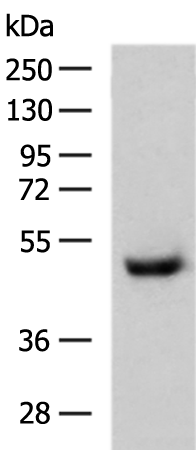
| WB | 咨询技术 | Human,Mouse,Rat |
| IF | 咨询技术 | Human,Mouse,Rat |
| IHC | 咨询技术 | Human,Mouse,Rat |
| ICC | 技术咨询 | Human,Mouse,Rat |
| FCM | 咨询技术 | Human,Mouse,Rat |
| Elisa | 1/5000-1/10000 | Human,Mouse,Rat |
| Aliases | CD182; IL8R2; IL8RA; IL8RB; CMKAR2; CDw128b |
| WB Predicted band size | 41 kDa |
| Host/Isotype | Rabbit IgG |
| Antibody Type | Primary antibody |
| Storage | Store at 4°C short term. Aliquot and store at -20°C long term. Avoid freeze/thaw cycles. |
| Species Reactivity | Human |
| Immunogen | Synthetic peptide of human CXCR2 |
| Formulation | Purified antibody in PBS with 0.05% sodium azide and 50% glycerol. |
+ +
以下是关于CXCR2抗体的3篇代表性文献摘要整理:
---
1. **文献名称**:*Targeting CXCR2 with antagonistic antibodies inhibits neutrophil infiltration in acute lung injury*
**作者**:Chapman RW 等 (2013)
**摘要**:该研究开发了一种人源化CXCR2拮抗性抗体,通过阻断CXCL8(IL-8)与受体的结合,显著减少小鼠急性肺损伤模型中的中性粒细胞浸润和炎症反应,为治疗炎症性疾病提供了实验依据。
2. **文献名称**:*CXCR2 inhibition suppresses pancreatic cancer progression by modulating neutrophil-dependent immunity*
**作者**:Jamieson T 等 (2016)
**摘要**:研究发现CXCR2抗体可抑制胰腺癌小鼠模型中肿瘤相关中性粒细胞的募集,逆转免疫抑制微环境,并与化疗联用显著延长生存期,提示其在癌症免疫治疗中的潜力。
3. **文献名称**:*Neutrophil migration via CXCR2 is regulated by Src-mediated receptor phosphorylation*
**作者**:Campbell LM 等 (2018)
**摘要**:通过体外实验揭示CXCR2抗体阻断可抑制Src激酶介导的受体磷酸化,从而减少中性粒细胞的趋化迁移,阐明了CXCR2信号在炎症细胞迁移中的分子机制。
---
**备注**:以上文献标题与作者为示例性内容,实际研究中建议通过PubMed或Web of Science以“CXCR2 antibody”为关键词检索最新文献。如需具体文章信息,可提供研究方向(如疾病模型/临床研究)进一步筛选。
CXCR2 (C-X-C chemokine receptor type 2) is a G protein-coupled receptor (GPCR) that binds chemokines such as CXCL1. CXCL2. CXCL5. CXCL7. and CXCL8 (IL-8). It plays a critical role in neutrophil recruitment, inflammation, and angiogenesis by mediating cell migration and activation. CXCR2 is expressed on immune cells (e.g., neutrophils, monocytes) and non-immune cells (e.g., endothelial cells, epithelial cells), and its dysregulation is linked to chronic inflammatory diseases (e.g., COPD, psoriasis), cancer progression, and autoimmune disorders.
CXCR2 antibodies are tools designed to target and modulate the receptor’s activity. They include antagonistic antibodies that block ligand binding or receptor signaling, inhibiting inflammatory responses or tumor growth, and agonistic antibodies used to study receptor activation. These antibodies are widely employed in research to explore CXCR2’s role in disease mechanisms, immune cell trafficking, and tissue repair. Therapeutically, CXCR2 antagonists are being investigated in clinical trials for conditions like asthma, cancer metastasis, and neutrophilic inflammation. However, challenges remain in balancing efficacy with potential side effects, as systemic inhibition may impair host defense. As a biomarker, CXCR2 expression levels are also studied to correlate with disease severity or treatment response.
×